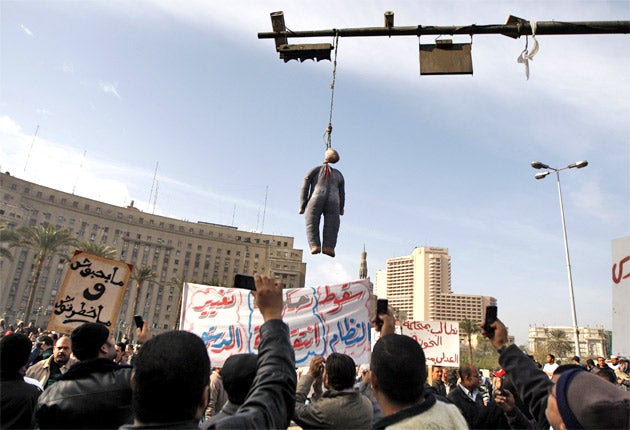Mubarak's pledge to stand aside in September elections fails to calm crowds

President Mubarak last night launched a desperate bid to extend his 30-year rule by seven months in the face of overwhelming popular opposition when he pledged not to stand for re-election later this year.
The move, made under intense American pressure, fell far short of the protesters' demands for a speedy end to the regime and the ushering in of a new and genuinely democratic Egypt to end a generation of dictatorship. But protesters immediately rejected his proposals to implement reforms while staying in office until an election in September.
Hours after the beginning of a designated official curfew following the biggest demonstration yet in the past eight days of protest, chants of "We will not leave, he will leave," were heard in Cairo's Tahrir Square.
"Friday afternoon, we will be at the palace," they also shouted, in reference to a march planned and dubbed "The Friday of Departure" aimed at pushing Mr Mubarak to leave office immediately.
In his televised address, Mr Mubarak refused calls to leave the country, a move which is regarded as a prerequisite for talks between the opposition and his newly appointed government. "In all sincerity, regardless of the current circumstances, I never intended to be a candidate for another term," he said. He added he would work during "the final months of my current term" to carry out the "necessary steps for the peaceful transfer of power".
"The Hosni Mubarak who speaks to you today is proud of his achievements over the years in serving Egypt and its people," he said. "This is my country. This is where I lived, I fought and defended its land, sovereignty and interests, and I will die on its soil," he said.
Before his address, Mr Mubarak had spoken on the telephone to US President Barack Obama for a reported 30 minutes. Soon after Mr Mubarak's address, President Obama emerged from the White House and said that Mr Mubarak "recognises that the status quo is not sustainable and a change must take place". Mr Obama said he had told Mr Mubarak of his belief "that an orderly transition must be meaningful, it must be peaceful, and it must begin now".
Around a million people spent the day calling for Mr Mubarak to step down in protests across the country. A large section of the crowd of men, women and children which had packed the square spilled into surrounding streets waving Egyptian flags and chanting above the noise of military helicopter circling overhead: "He goes, we are not going."
As effigies of the President were hung from traffic lights in some locations, crowds in Alexandria chanted: "Mubarak wake up, today is the last day."
However, after the President's televised statement, groups of pro-Mubarak demonstrators, some carrying sticks, were on the move late last night in an attempt to challenge opponents of the regime who had still not returned home from the streets late last night.
Though they were small compared with the vastly larger anti-Mubarak protests earlier in the day, their presence in Alexandria triggered stone-throwing clashes between the rival groups, with the army firing warning shots, apparently to keep the two sides apart.
The Egyptian diplomat Mohamed ElBaradei, the emerging figurehead of the opposition movement, called Mr Mubarak's moves "a trick" to try to remain in power.
He said that the message from the protesters was that Mr Mubarak should step down and "leave the country" if not immediately, by Friday at the latest.
Calling on him to do so, the former head of the UN nuclear agency said he should be spared a trial if he left voluntarily and added: "I don't think he wants to see more blood."
He told Al Arabiya that the President had to leave before protest leaders would take part in talks between the new Mubarak-appointed Vice-President, Omar Suleiman.
"There can be dialogue but it has to come after the demands of the people are met and the first of those is that President Mubarak leaves," he said. The call was echoed by protests across the country, including in Alexandria, Egypt's second city, in Suez and the Nile Delta.
Subscribe to Independent Premium to bookmark this article
Want to bookmark your favourite articles and stories to read or reference later? Start your Independent Premium subscription today.

Join our commenting forum
Join thought-provoking conversations, follow other Independent readers and see their replies